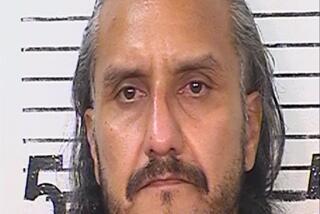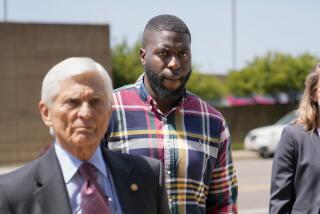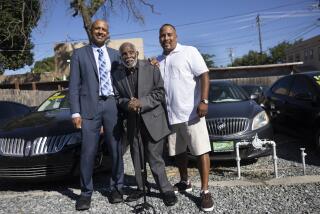La Jolla Lawyer’s Killer Pleads Guilty to Voluntary Manslaughter, Goes Free : Justice: A 1982 second-degree murder conviction was overturned based on misconduct by the county prosecutor’s office.
Herman Martin, whose 1982 second-degree murder conviction was overturned because of San Diego County prosecutors’ misconduct, has pleaded guilty to voluntary manslaughter in the killing of a La Jolla attorney.
In exchange for the 68-year-old Martin’s plea, the California attorney general’s office agreed that the Solana Beach insurance executive will receive credit for the four-plus years already spent in prison from 1982 to 1987 and serve no more time.
The plea bargain, announced Wednesday in San Diego Superior Court, ended the case’s lengthy and complicated history and avoided the retrial the California Supreme Court ordered in 1987 after finding that Martin’s first trial was tainted by San Diego County prosecutors’ misconduct.
That ruling was based on the 1986 findings of a special judicial referee--findings that so enraged Dist. Atty. Edwin L. Miller that a San Diego judge later ordered his office off the case because Miller had “lost his perspective.”
Lawyers in the attorney general’s office, which took over the case after a state appeal court backed up the order by San Diego Superior Court Judge J. Perry Langford dismissing local prosecutors, expressed satisfaction Thursday with the deal. So did Martin’s current attorney, Robert Grimes.
But the district attorney’s office said it was a bad bargain.
“We disagree with the disposition in the case,” spokesman Steven J. Casey said. “The district attorney believes that the case should have gone back to trial.
“But, it was in the attorney general’s hands and they are good and capable and skilled people,” Casey said. “They made a different assessment, and so be it.”
Martin was charged with arranging the 1981 killing of La Jolla attorney Richard Crake. He was convicted in March, 1982, of second-degree murder.
But Martin won a new trial in November 1987 when the state Supreme Court found “serious misconduct” by San Diego County prosecutors.
That 1987 decision upheld the findings of a special referee, appointed by the high court to investigate the case. Retired appellate justice Gerald A. Brown concluded in a 1986 report that misconduct by a prosecutor in Miller’s office and perjury by the key witness resulted in Martin’s wrongful conviction.
Brown’s findings had so angered Miller that he issued press releases and made strong public statements criticizing the report.
Miller said in a 1986 interview that Brown’s analysis of the case had been a “rather naive, gullible approach.” Shortly after the 1987 Supreme Court ruling, Miller called Brown’s report “just bunk.”
Martin’s appeals attorney, Charles M. Sevilla, then charged that Miller was so biased against Martin that Martin could not receive a fair trial if the San Diego district attorney’s office was involved. Sevilla said Martin was trying to “vindicate” the honor of his office by proving Brown wrong and winning Martin’s conviction a second time.
In June of this year, the 4th District Court of Appeal in San Diego agreed, saying in a decision issued that the “district attorney’s involvement in the Martin case” had moved from “purely impartial ‘professional’ concerns to undue ‘personal’ concerns based on a desire to prove the referee’s findings wrong.”
On Oct. 11, the state Supreme Court let that decision stand without comment.
Under the plea bargain, the attorney general’s office agreed to drop three additional counts against Martin--assault, conspiracy to commit extortion and conspiracy to commit assault with a deadly weapon.
Under the sentencing rules for manslaughter in 1981, Martin could have been sentenced to two, four or six years in prison, Deputy Atty. Gen. Louis Hanoian said. Because the attorney general’s office would have recommended a four-year sentence and Martin already had served nearly five years, the office agreed to no further jail time, Hanoian said.
“Under the circumstances, we think that’s a proper disposition,” Hanoian said. “The evidence in our view over the years isn’t as strong as the initial time when the case was tried.”
The deal was attractive to Martin because, in recent months, his wife had died and he had been through heart surgery, Grimes said.
“Herman isn’t in a position to fight it any more,” Grimes said.
Formal sentencing was set for Jan. 10.
More to Read
Sign up for Essential California
The most important California stories and recommendations in your inbox every morning.
You may occasionally receive promotional content from the Los Angeles Times.










